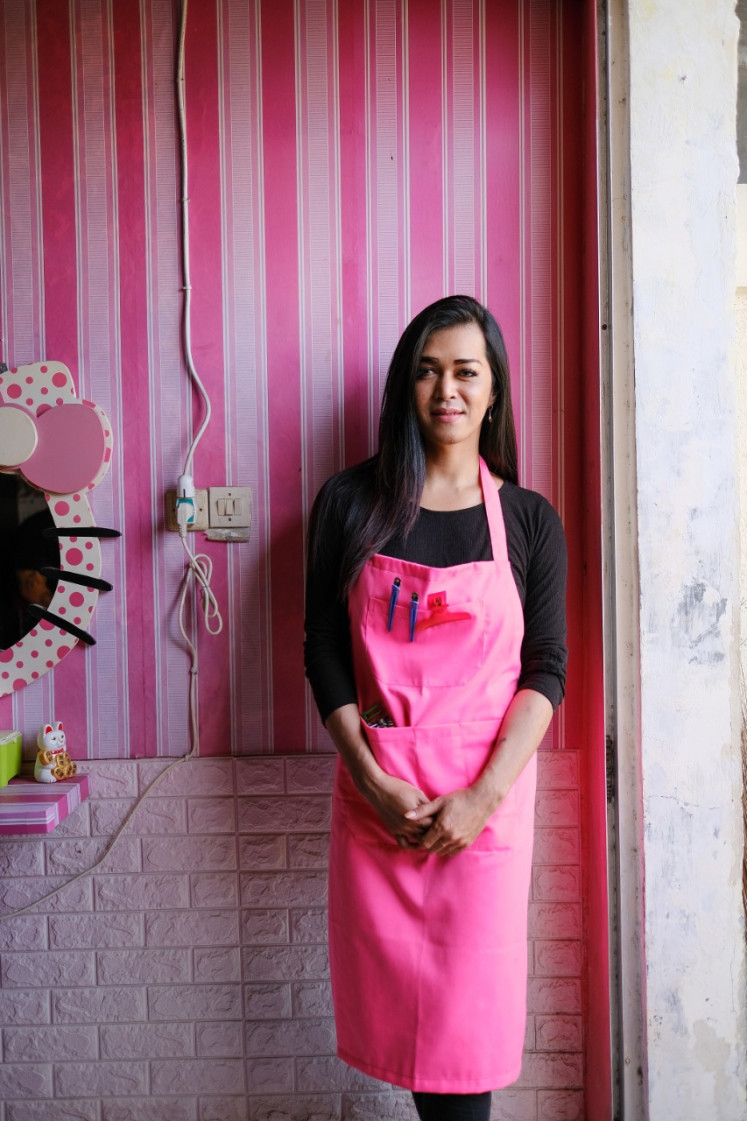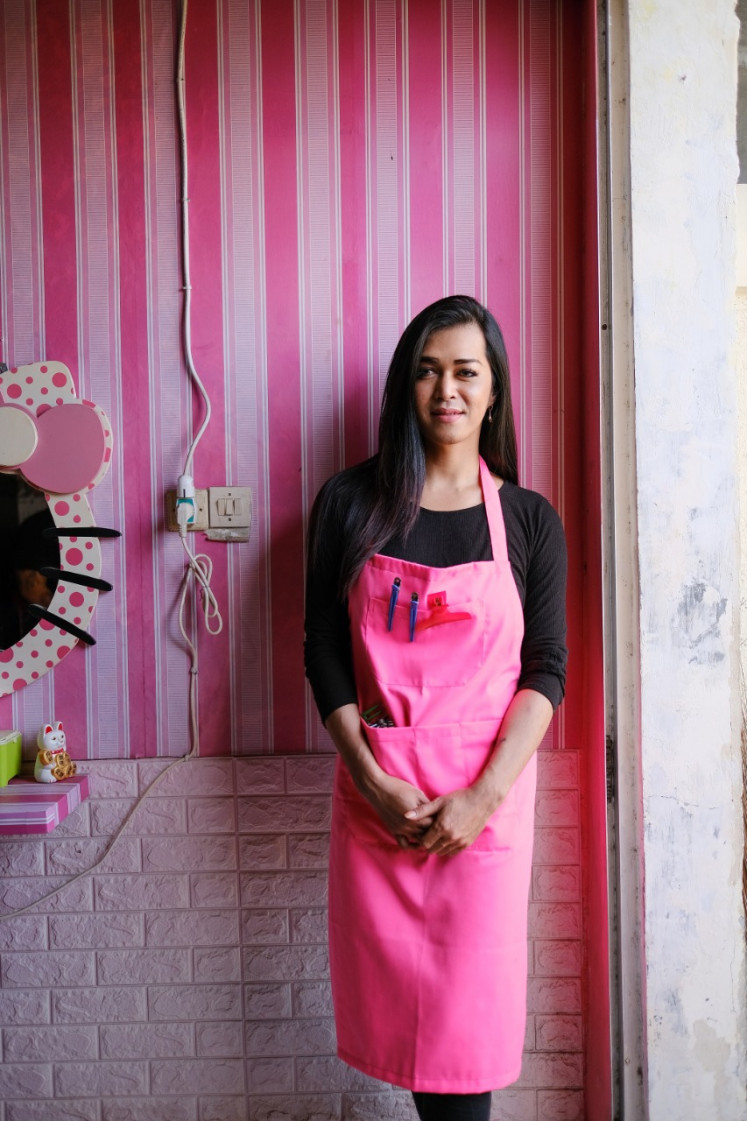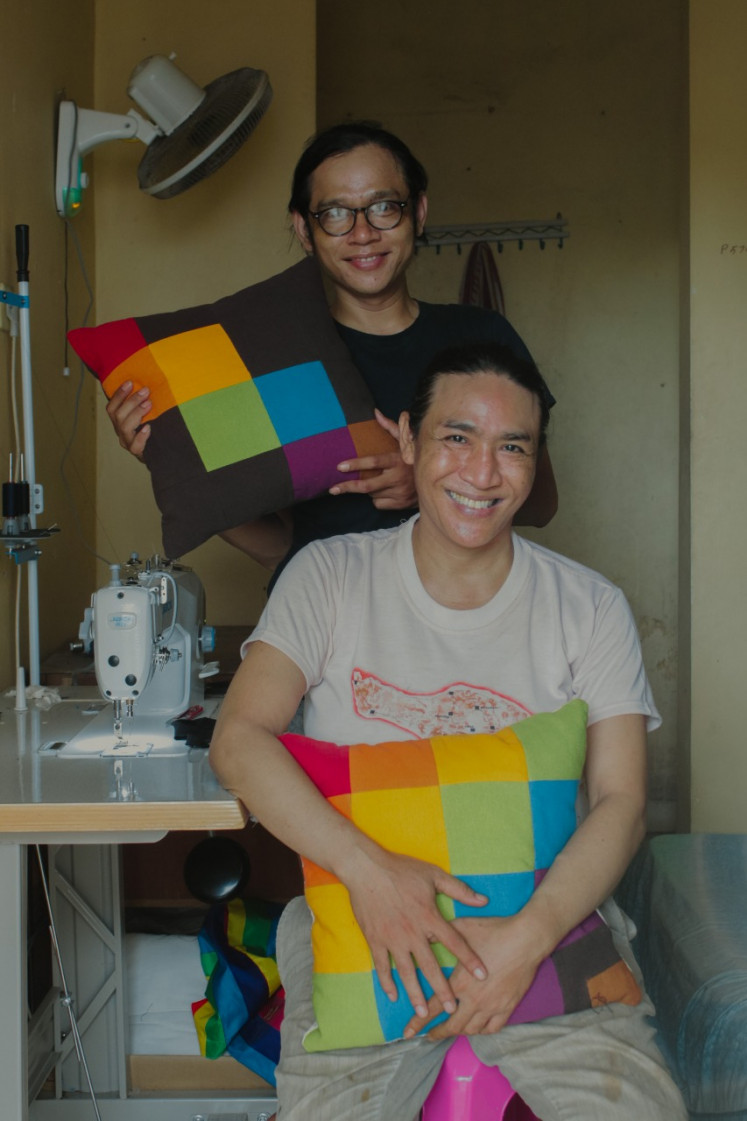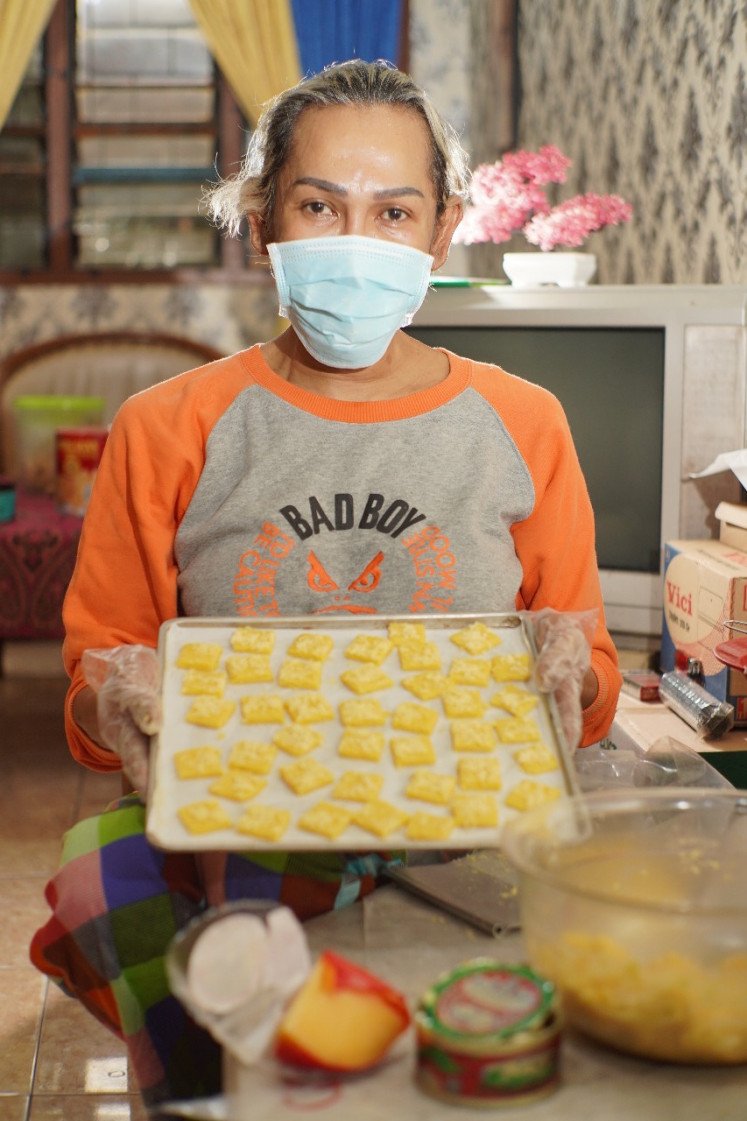
Natashya Alma, 36, began her small beauty parlor in Surabaya, East Java, with her former boyfriend, Widodo, and named it Nathwi, a blend of their names. Widodo provided the salon’s equipment, while Natashya was responsible for the technical aspects.
Following their separation, Natashya, who also worked as a dancer and a model, moved to Denpasar, Bali, where she continued her business, this time under the name Blossom.
“I just like that name,” she said, adding that her brand focused on high-quality yet affordable hair treatments.
As a trans woman, Natashya was aware of the growing discrimination against her in Indonesia, the world’s largest Muslim-majority country. It did not stop her from pursuing her passion. In fact, she believes that being part of the lesbian, gay, bisexual and transgender community (LGBT) has its own benefits when it comes to running her business.
“People, in general, prefer [their hair treatment] to be handled by LGBT people because we are more thorough and the results are satisfactory,” she said.
Furthermore, Natashya believes that the more LGBT Indonesians start their own businesses that benefit society, the more they would be accepted.
“Slowly, they will accept the existence of our people who run businesses and appreciate us,” she added.
Overcoming stigma
Natashya is just one example of LGBT Indonesians who run their own businesses while being open about their identity. In recent years, Southeast Asia’s biggest economy has shown growing hostility toward gender-minority groups.
Tika, 25, and her partner Della, 26, both based in Depok, West Java, were aware of the stigma. Together, they recently opened Hutan Seni Art & Craft, which sells clothes, tote bags, postcards, necklaces and mini sketchbooks among other items.
 Against stigma: Natashya Alma, 36, established ‘Blossom’, a beauty parlor, in Denpasar, Bali. She is one of the few Indonesian trans women who has started a business despite the stigma against them. (JP/Courtesy of Blossim)
Against stigma: Natashya Alma, 36, established ‘Blossom’, a beauty parlor, in Denpasar, Bali. She is one of the few Indonesian trans women who has started a business despite the stigma against them. (JP/Courtesy of Blossim)
To tackle the stigma, Tika and Della are determined to show their contribution to the community by running a responsible business. For them, this is important in order to show people that LBGT businesses are not only creative but also care for the environment.
“We try to minimize plastic bags — although it’s not 100 percent yet,” said Tika, adding that it was important to hold on to the “uniqueness” of the LGBT identity.
Similarly, Venon Sa’id Ali, 27, and Ida Bagus Jagannatha, 25, started Kwiir in September 2020 in Denpasar, Bali. They began by providing workshops for trans women whose means of living drastically declined because of the COVID-19 pandemic. The workshops included free sewing courses.
 Enjoying work: Trans women under Kwiir work hard during the COVID-19 pandemic. (JP/Courtesy of Kwiir)
Enjoying work: Trans women under Kwiir work hard during the COVID-19 pandemic. (JP/Courtesy of Kwiir)
Venon, who identifies as queer and uses they/them pronouns, said that following the course’s conclusion, Kwiir began selling products such as handmade tote bags and decorative pillows.
Though conceding that it was often difficult to run a business as part of the LGBT community, Venon said it was important for Kwiir to put forward its beliefs in its company profile. Both founders maintained that by doing so, Kwiir could show its support for the community while continuing to create.
“Our profile states: Made by trans and queer creators,” they said.
Quality
Rikky Muchammad, 35, a gay man and organizer of Sanggar Seroja, a collective small business and cooperative chiefly run by trans women, acknowledged that Indonesian netizens could be quite nasty toward them.
“There were some Indonesians who left nasty comments about us on YouTube,” he said.
Sanggar Seroja focuses on small culinary ventures. It teaches trans women to deliver high-quality products, work on their confidence in handling customers and other skills, such as communications, using mobile applications and reaching out to delivery services.
So far, customers have given the business a positive response, provided feedback, as well as promoted its products on their personal social media accounts.
Rikky believes that at the end of the day, it all comes back to the quality of the products, reasonable prices, quality service and promotions in order to maintain and grow the businesses.
“Even a master chef selling premium-priced boxed meals will experience a business decline if the food is not delicious,” he said. “I want to remain optimistic, although more effort and strategy are needed for [our] products to be well-received by society in general.”
Sanggar Seroja was established last March by Rikky and several friends after many trans women who mainly worked as beauticians, street singers and sex workers lost their income because of the COVID-19 pandemic. Many beauty parlors were forced to close, while make-up artists were either let go or faced many cancellations from their customers. Street singers and sex workers also lost their customers.
 Delicious snacks: Trans women under Sanggar Seroja focus on culinary businesses. (JP/Courtesy of Sanggar Seroja)
Delicious snacks: Trans women under Sanggar Seroja focus on culinary businesses. (JP/Courtesy of Sanggar Seroja)
“Food became the new alternative to making ends meet,” Rikky said.
Sanggar Seroja members currently sell products with long shelf lives, such as chips and fried shallots. While several lockdown periods might have hindered deliveries, sales of chips and fried shallots were more stable in terms of sales compared to other products.
“For other products [that we sell] such as cakes, we have to use instant-delivery services that are more expensive, which saw many customers cancel their orders,” he added.
Rikky said that unlike beauty parlors and entertainment businesses, which are considered the forte of LGBT people, trans women under the Sanggar Seroja umbrella needed to work harder to convince customers about their food products.
“Questions such as, is the kitchen hygienic? Is the food healthy? Can they [trans women] actually cook? Do they follow safety protocols?”
Resilience
Natashya conceded that her businesses have slowed down ever since the pandemic hit the world last year, including in the tourism-reliant island of Bali.
“[My] income has gone down by 40 percent,” she said.
She revealed that in order to make ends meet, she went back to sex work, something that she was not ashamed of. Natashya’s Blossom opens at 9 a.m. and closes at 9 p.m. After that, Natashya would go on to the streets.
“I don’t want to be stuck. I still need to pay my rent, food and pay off my debts,” she said, adding that some of the cash that she got from sex work also went to the salon.
For Tika and Della, whose business relies on creativity, the pandemic affected their motivation to create products. As a result, they did not release new products in 2020. They also planned to open standing booths in art markets, but that had to be canceled due to the pandemic.
“But [other than that], there are no crucial problems,” she said.